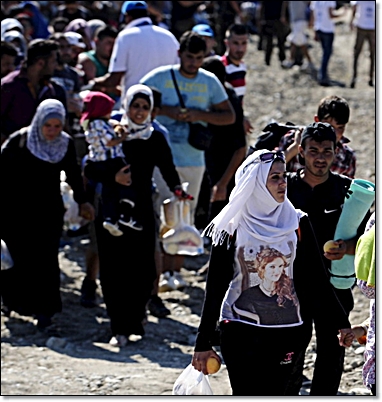Economic Immigrants, What Europe Must Do
 |
| Syrian refugees |
We all know that Asia produces many economic immigrants who not only end up in Europe but also in Africa. The EU –after feeling the heat of the surge of refugees mainly from Syria and economic immigrants from Eastern Europe, Asia and Africa –found itself gasping with a bigger problem than envisaged. So, it had to do something to arrest the “threat” to its development, culture and wellbeing. It offered 2 billion dollars that African leaders rebuffed wanting the West to stop exploiting Africa. They said categorically that they don’t need money but fair and just trade. The token given didn’t even make sense. How could Germany spend 20 billion Euros in dealing with refugees and think that over 50 African countries could spend one tenth of the amount to stop the phenomenon? “Germany's federal states and municipalities could face costs of up to 16 billion euros (11.47 billion pounds) next year to deal with the refugee crisis,” the Association of German Cities says. African leaders have the bargaining chip that will change everything shall they cling unto it and use it wisely to their advantage.
Again, looking at what causes economic immigrants to become a permanent phenomenon, we find that the measures the EU envisaged to take seem to find and offer a temporal reprieve. Arguably, poverty resulting from unjust and unfair trade in Africa and Asia is the only cause of economic immigrants. Now what should be done? True, inequitable and exploitative relationship between the global North and the Global South is the major cause of all this. Deconstruct it and reconstruct it based on equitable and just exchange.
Although the North-South relationship in dealing with trade and development has worked in some places, it is still inequitable; and enables the Global North to exploit and dominate the Global South, thus cause poverty based on struggle for resource and drive to meet unmet needs. Ontologically, the relationship between the Global North and the Global South as extension of colonialism is embedded in how the two do business.
Diagnostically, it is noteworthy that the Global North has more causation of poverty than a solution. Due to the hegemonic nature of this relationship, the Global North uses its market-oriented neoliberal policies to exploit the Global South. Therefore, the EU’s proposal of making Africa “liveable” by offering some cash is not a panacea. Embark on equitable commercial and economic relationship and everything will change for the better for both parties. After either suffocating and ignoring or side-lining the Global South, the Global North created a paternalistic and clientele system in which the latter is at the receiving end while Global North is in the position of dictating everything as far as the relationship between the duo is concerned.
Theoretically, the relationship between the Global North and the Global South is treated as a major cause of poverty due to its exploitative nature. So, too, the relationship in question has caused a lot of conflicts in the Global South resulting from struggle for resource control. It must be underscored from the outset that the relationship between the Global North and the Global South is more of conflictual than peaceful due to the fact that under the basic needs theory, there are a lot of needs that are not met in the Global South due to the exploitative nature of the relationship between the Global North and the Global South. Again, despite the basic human needs theory being propounded by Western scholars, the Global North has never practically and equitably applied its rationale when it comes to dealing with the Global South.
The neglect of basic human needs in the Global South has led to stinking poverty resulting from uneven and unfair distribution of resources of which many are sold to and consumed in the Global North. The conflict resulting from North-South relationship regulated by capitalistic market has been overlooked as a good cause of poverty in the Global South. Arguably, such an unfair relationship has fuelled violent conflicts that have always preoccupied the international community.
The conflicts seem to have been internalized. Refer to how the International Monetary Fund (IMF) the World Bank (WB)and other International Financial Institutions (IFIs) have always applied double standard in dealing with the Global South. There are some flaws in the Global North’s policies superimposed on the Global South. The approach that the international community has taken under the diktat of the Global North massages the exploitation so as to be overlooked as a major cause of the problem of economic immigrants.
If the EU seriously wants to do away with the economic immigrant phenomenon, it must marshal the whole Global North to overhaul its exploitative relationship that has seen African countries supplying raw material and consuming processed goods. The solution is only in economic and technological exchange instead of clientele relationship. Africa has raw materials. Europe has technology. If the two will agree to exchange their products, chances of turning things around are high. Offering billions of dollars won’t solve the problem especially in the continent under many corrupt and inept governments.
By Nkwazi Mhango.
Mhango is a Peace and Conflict scholar based in Canada and author of Saa ya Ukombozi, Nyuma ya Pazia, Souls on Sale, Born with Voice and his academic book Africa Reunite or Perish.
